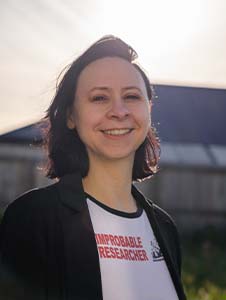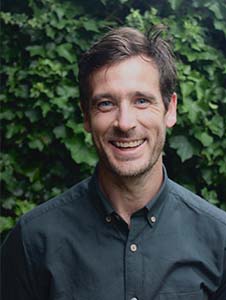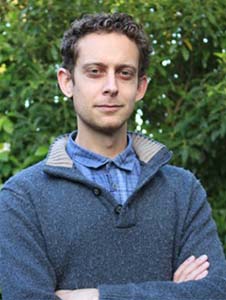Wednesday 13 October 2021 1:05pm
In August this year, 15 early and mid-career researchers received an Accelerator Grant from the Division of Health Sciences. These Grants are intended to enhance the career development of some or our extraordinary early and mid-career researchers. This was the first year these Accelerator Grants have been awarded.
Over the next few weeks, we will run a series of articles highlighting these talented early and mid-career researchers from the Division of Health Sciences.
Today, we provide more insight into the projects of recipients Dr Simone Bayer, Dr Matthew Jenkins and Dr Mike Pankhurst.
Dr Simone Bayer

Dr Simone Bayer
Dr Simone Bayer is a Research Fellow with the Department of Medicine at the University of Otago’s Christchurch campus. Her research project investigates a putative signalling pathway in Irritable Bowel Syndrome (IBS).
“I am driven by a need to learn and to know. IBS is a condition that has been known of for a long time, and it affects many people worldwide independent of age, gender, economic status, or ethnicity, yet nobody knows exactly why and how it arises and how to fix it. It is a puzzle I feel the need to solve.”
There is currently no cure for IBS, and treatments that aim to manage symptoms are not working for everyone. In addition, treatments do not help efficiently with the pain that is the defining characteristic of IBS.
Dr Bayer suspects a specific molecular pathway is dysregulated in IBS, which is responsible for pain signalling and inflammation. She has received funding to determine if downstream enzymes of this pathway can be seen with fluorescence microscopy in colon tissue.
If this pathway is active in IBS, it would not only explain the reason for pain, but also for the observed chronic effects on the brain like depression and anxiety. This may lead to the development of a biomarker for IBS and to a successful treatment.
Read more about the Gastrointestinal Unit for Translational Studies
Dr Matthew Jenkins

Dr Matthew Jenkins
Dr Matt Jenkins is a research fellow in mental health, in the Department of Psychological Medicine, Wellington. His main area of interest is the interface between physical and mental health and the role of physical activity in health promotion, both for clinical and non-clinical populations.
“I’ve been passionate about body movement for as long as I can remember, seeing it as a cornerstone of good holistic health and as a platform for many other health promoting behaviours and factors, not least social connection. It is through my research in motivation that I became interested in mental health, as these two areas are strongly connected.
“People living with serious mental illnesses suffer from much poorer physical health than the general population. It doesn’t need to be like this, and so one of my main research goals is to address and reduce physical health inequities by working with people who are experiencing mental illness to support healthier lifestyles.”
The funding from this grant is to organise an event named ‘Mahi Tahi’ (doing the work together) to build relationships within the local Wellington community, and to co-design a project to enhance community health through movement. Mahi Tahi was co-organised with Wellington City Mission, a local organisation that supports people experiencing various issues such as poverty, homelessness, and certain health conditions.
The funding has been used to remove barriers to attendance and for some guest speakers and activators. These include Wiremu Sarich, a youth educator from Te Rarawa (Northland), who will discuss and demonstrate the importance of taonga tākaro (traditional Māori games) in enhancing health; a local school’s multicultural society to lead a dance session, and Kaumatua Kuni Shepherd from Mental Health Addictions and Intellectual Disability Services to open the day.
The event was originally scheduled for 23 September, but due to COVID-19 restrictions it has been re-scheduled for 28 October.
Dr Jenkins is originally from the UK, with an undergraduate degree in Psychology and a master’s degree in Sport and Exercise Psychology. He arrived in Dunedin in 2014 after a year of cycling around South East Asia, to undertake a PhD studying exercise motivation in the School of Physical Education, Sport and Exercise Sciences before taking up his position in Wellington.
Read Dr Jenkins profile on our website
Dr Mike Pankhurst

Dr Mike Pankhurst
Dr Mike Pankhurst is a Lecturer and Sir Charles Hercus Research Fellow with the Department of Anatomy in the School of Biomedical Sciences.
The objective of his research is to improve fertility outcomes for women.
“The maternal age at first childbirth has been increasing in Aotearoa since the 1960s but the age of onset of infertility has not changed. There is a need for improvements in fertility treatment for women, but the causes of age-related infertility are poorly understood.”
His lab investigates the causes of age-related infertility in females, studying the decline in egg-quality that occurs with ageing and the factors that determine the age of menopausal onset.
Dr Pankhurst completed a bachelor’s degree in Biochemistry and Zoology, and a PhD in Medical Research (brain injury) at the University of Tasmania, Australia. He joined the Anatomy Department at Otago to complete a postdoctorate degree looking at how reproductive hormones affect brain development before moving into his current field.
